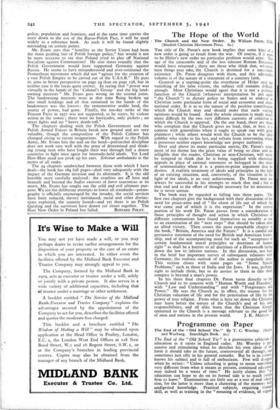The Hope of the World
d The Church and the New Order. By William Paton, D.D. (Student Christian Movement Press. 6s.) THE title of Dr. Paton's new book implies that some kind of a new order is going to result from the war. Of course, if it were to be Hitler's new order no particular problem would arise. The age of the catacombs and of the less tolerant Roman Emperors would have returned ; there are those who think that, whatever turn things may take, the Church is destined for a catacomb. existence. Dr. Paton disagrees with them, and this admirable volume is of the nature of a statement of a contrary faith.
Granted as a starting-point the overthrow of. Hitler and the vanishing of his false visions, the subject still remains difficult enough. Most Christians would agree that it is not a prima function of the Church (whatever interpretation be put upon. " the Church ") to dictate policy to States and to endorse as Christian some particular form of social and economic and inter- national order. It is as to the nature of the positive-contribution which the Church may and should make that such varying opinions would be found. And the whole situation is made much more difficult by the two very different currents of criticism to which the Church is opposed. On the one hand, there are those who complain that the Church gives no lead, that, at best, it is content with generalities when it ought to speak out with great plainness ; while others would wish the Church to be the ideal cobbler who sticks to his last, and refrain from intervening where it possesses neither expert knowledge' nor proper authority.
Over and above its many particular merits, Dr. Paton's treat- ment of his theme has the great value of being so clear and in- telligible that the reader, Christian or non-Christian, will never be tempted to think that he is being supplied with rhetorical appeals in place of rational statement or befogged in the mists of sentimentality when it is a point-to-point argument that he desires. A realistic treatment of ideals and principles in the light of an existing situation, and, conversely, of the situation in the light of the ideals, is no easy achievement. Dr. Paton may not always be successful in his attempts to reach that end ; but to that end and to the effort of thought necessary for its attainment he is never untrue.
The book may be regarded as falling into three parts. The first two chapters give the background with their discussion of the need for peace-aims and of " the chaos of life out of which the war came and of which it is the expression." In the central portion of his work Dr. Paton passes from a consideration of those principles of thought and action in which Christians of different communions have found themselves so notably at one to an examination of the " next steps " that should be taken after an allied victory. Then comes the most remarkable chapter in the book, " Britain, America and the Future." It is a candid and persuasive statement of the need for British and American leader- ship, and of the accompanying need for such an " acceptance of certain fundamental moral principles or doctrines of human right " as shall be a barrier to all doctrines of a Herrenvolk laying down the law to inferior nations. In this discussion, not least in the brief but important survey of subsequent relations with Germany, the realistic outlook of the author is singularly clear. This section closes with some pages on " Some Special Problems," such as those of India and the Jews. It was, perhaps, right to include them, but to do justice to them in this short compass is beyond a man's power.
In his and final chapters Dr. Paton turns directly to the Church and to its concern with " Human Worth and Freedom,' with " Law and Understanding " and with " Forgiveness and Power." He sees the Church as, in effect, the trustee for the Christian valuation of life and for the penetration of life by the power of true religion. From what is here set down the Christian may learn better the nature of the Church's and of his own responsibilities; and all alike learn that the Christian Gospel entrusted to the Church is a message relevant to the good life of men and nations in the present world.


























 Previous page
Previous page